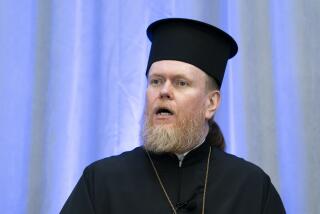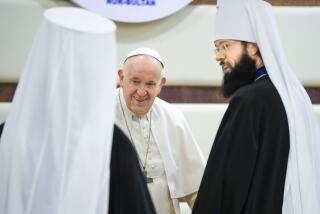Thatcher Wades Into Crowds of Amazed Soviets
- Share via
ZAGORSK, Soviet Union — British Prime Minister Margaret Thatcher waded into crowds of amazed, curious Soviet citizens Sunday, mixing with shoppers in a crowded Moscow supermarket, visiting two families in their homes and lighting a candle for peace in a Russian Orthodox Church.
The extent of her contact with ordinary citizens was considered virtually unprecedented for a visiting Western leader and seemed to underscore the sense of change currently under way in the Soviet Union.
Thatcher was on the first full day of a planned five-day visit to the Soviet Union. She is scheduled to hold private talks with Kremlin leader Mikhail S. Gorbachev this morning and expand them to include other officials from both countries later in the afternoon--talks that are expected to dwell on such major East-West issues as arms control.
She Presses the Flesh
But Sunday, to the consternation of plainclothes KGB security men assigned to her trip, Thatcher spent much of her time pressing the flesh in a style more evocative of a Western-style politician during an election campaign than a visiting dignitary in a Communist country.
At the entrance to the famous St. Sergius Monastery here, Thatcher momentarily stunned Soviet security guards by suddenly veering away from the entrance and mingling with a crowd of onlookers.
As she smiled and shook hands with startled Soviet citizens, several plainclothes security men surfaced from within the crowd to give her room to move.
It was a scene repeated often during the day.
Although she frequently received flowers and was politely applauded, it was clear the crowds came more to gawk than cheer what was for them the strange spectacle of a Western, female head of government moving among them.
Still, her presence in a camel-hair coat and beige mink hat generated unusual excitement.
One resident of the Moscow apartment complex Thatcher visited Sunday afternoon pronounced her “kind, sympathetic and pretty.”
Inside the building, Thatcher visited two families. One resident presented her with flowers, kissed her on the cheek, leaving bright red lipstick marks and announced, “I’d very much like to buy a ticket to come to your country.”
Thatcher later went to a nearby supermarket where she purchased bread, cheese and canned fish before responding to more applause with smiles and waves.
‘I Am Amazed!’
At one point, she stood on the lower door frame of her armor-plated Zil limousine and waved to the crowd.
“They gave us a marvelous welcome despite the raw cold (weather),” she told a reporter. “I am amazed!”
During formal remarks at a lunch in Zagorsk with church leaders after visiting the medieval monastery in this 14th-Century town 44 miles north of Moscow, Thatcher alluded to the expectations awakened by Gorbachev’s policy of glasnost (openness) but steered clear of direct references to human rights.
“For a few short minutes I’ve paused to reflect, I’ve lit my candle . . . to represent the hopes, anxieties and fears of thousands of anonymous individuals,” she said. “The candle I’ve lit is for the future in the hope my visit to the Soviet Union will carry forward the cause of peace, freedom and justice.”
Meantime, about three dozen Soviet citizens took advantage of Thatcher’s visit to demonstrate in support of their demands to emigrate. Police, who customarily forbid such public protests, stood back and did not interfere and got a rare tribute from the so-called refuseniks--persons denied permission to emigrate.
“We appreciate the new attitude of the Soviet police, who for the first time did not try to break up our demonstrations by brute force,” the demonstrators said in a statement. “But demonstrations are just a means to our ultimate goal--to get exit permission.”
Churches Not ‘Empty Shells’
In Zagorsk, Thatcher described the churches within the monastery, which is the seat of the Russian Orthodox Church, as alive and not “empty shells.”
“I hope this will continue, with the principle that freedom of religious belief will grow ever stronger here in the Soviet Union and around the world and that many of those people imprisoned for their faith will be freed,” she told her hosts.
British officials said she visited the venerable religious center as a demonstration of solidarity with Soviet Christians.
The monastery rector told reporters that the number of students studying for the priesthood in the Soviet Union has doubled in recent years to about 1,300, a development he implied was linked to Gorbachev’s new policy of greater openness.
He estimated that about 30 million Russians are still practicing Christians and said Grobachev’s policies for change will help the church by providing it with “more conscientious, more purified people.”
No Challenge to Communism
Although the Russian Orthodox Church has never overtly opposed the Soviet system in the way the Roman Catholic Church has challenged communism in Poland, the Kremlin has severely restricted church activities since the Bolshevik Revolution in 1917.
Former Soviet leader Nikita S. Khrushchev is said to have closed all but 18 of the church’s 94 monasteries between the mid-1950s and mid-1960s.
Sunday evening, Thatcher attended a performance of Tchaikovsky’s ballet “Swan Lake” with Gorbachev and his wife, Raisa, at the Bolshoi Theater.
More to Read
Sign up for Essential California
The most important California stories and recommendations in your inbox every morning.
You may occasionally receive promotional content from the Los Angeles Times.












